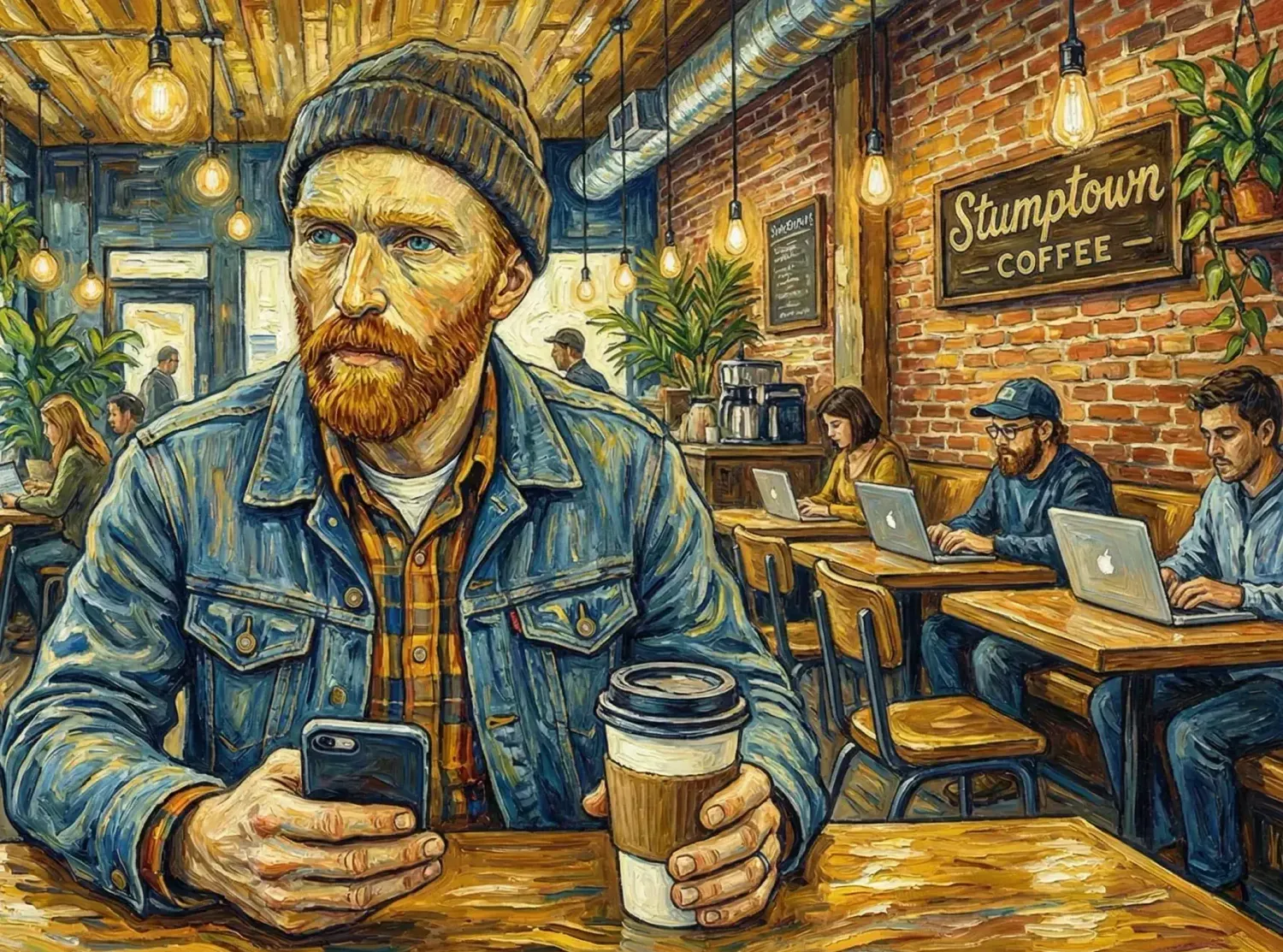A Script for Losing Your Religion

(Part 1 of a series on Vincent Van Gogh's spirituality)
That concert I did for Van Gogh Alive at the Dali Museum got me reading up on Vincent Van Gogh's life. He wrote hundreds of letters to his brother, & I've been able to read many of them thanks to this incredible archive.
Art critics already write about his paintings from every perspective imaginable. I'm not writing an art criticism post. My attention is on Van Gogh's spiritual life, which is as fascinating as his artistic life but receives no attention.
Vincent grew up in a devout Dutch Calvinist family. His grandfather was a Reverend, and his father was a preacher. His uncle was an academic theologian & preacher. The Van Gogh family contributed to the Groningen Theology School, a reform movement that influences Reformed Calvinism to this day.
Van Gogh intended to be a preacher too. Yet, he lost his faith in a tale that sounds like the average modern teenager's loss of faith. Church hypocrisy & sexuality were the main reasons Van Gogh left Calvinism.
Nothing New Under The Sun
Once you know Van Gogh's spiritual journey, you know the spiritual journey many Americans still take today. His journey away from religion reminds me of Donald Miller's autobiography "Blue Like Jazz" (both the book & the movie versions).
In Blue Like Jazz, a young American student leaves his fundamentalist Protestant church in Texas to attend Reed College in Portland, OR. Rural Texas is an epicenter for Protestant fundamentalism, Portland is an epicenter for atheistic liberalism. By the end of "Blue Like Jazz," Miller has lost faith in his hometown's fundamentalist doctrines.
Like Donald Miller, I also grew up in "Bible Belt" Texas & headed to the god-forsaking West Coast for college. I studied at one of the largest Protestant universities in America: Azusa Pacific University, near Los Angeles, CA.
Los Angeles is a progressive metropolis like Portland.
Azusa Pacific has a well-deserved reputation for being theologically liberal. It helped birth the worldwide Pentecostal movement, being only a short drive from the Azusa Street Revival and employing many of its disciples.
You can study whatever theology you want at APU. Their theology school has Catholics, Orthodox, High Church Anglicans, Old School Reformed, Wesleyans, Evangelicals, & PCUSA Presbyterians.
APU also has a handful of theology professors who believe Christ's Resurrection is fiction. We had a scandal in my upperclassman years when one of the theology professors decided to become a man, thus violating the university's moral code and de facto resigning.
It's normal for APU students to have a faith crisis. I know classmates who lost their faith like Van Gogh & Donald Miller. Watching Blue Like Jazz was a spiritual experience for these students.
The God-Forsaking Script
There's a script many modern people follow in their journey out of religion. If it doesn't sound instantly familiar, it will soon.
It's not the only script, but it is a common one. The script fits Van Gogh's life, the story of Blue Like Jazz, & lots of American "Exvangelicals" (former Evangelical Protestants). Here's what tends to happen:
1. A young man grows up in a rural town with a conservative Christian family.
2. In his late teens, he wants independence. He leaves for the city to pursue new things: perhaps education, a career, a passion, or a relationship.
3. In the new environment, he realizes he doesn't have to attend church anymore. Now church is a choice requiring time & energy he could put towards other things.
4. City life introduces him to new ideas & lifestyles that weren't tolerated in his hometown. He becomes disillusioned with the institutional church of his youth.
5. His conservative family & friends object to a passion he begins pursuing. The passion may be a vocation or a sexual lifestyle. The disapproval further alienates him from his hometown Christian community. Why should he subject himself to people who judge his passion?
6. Church becomes a choice that no longer makes sense to him, so he stops going. He replaces Christian practices with the activities he finds fulfilling.
7. His beliefs about God gradually drift away from the doctrines of his hometown church. His doctrine evolves according to passion, fashion, personal experience, and the irreligious community he builds around his passion.
At the end of this journey, the young man constructs a life with no relation to God or church. He has personal fulfillment, a career, community, passion & freedom, all without needing to think about God or attend a church. He becomes irreligious by default simply by continuing on this life path.
He may become a belligerent atheist who hates his childhood religion, like the New Atheists. Or he may become apathetic towards institutional religion, like the "spiritual-but-not-religious" or "None" crowds.
Either way, he becomes hostile towards his childhood religion. That's usually some Christian denomination. Judaism also loses many of its young adults in the same way.
Secular Gravity of the Modern City
Modern people follow this script so often because Modern culture is structured to push people towards it. Modernity is designed to work without religion, so we shouldn't be surprised it trains people to work without religion.
It's a problem in both the Liberal-Capitalist West & the Post-Soviet East, but for different reasons. Enlightened capitalists & Marxist governments both aim to provide total human fulfillment without getting churches involved.
Modern success is an argument for atheism, although nobody ever presents it as a philosophical argument. But it's an argument that doesn't need words.
Atheism is so strong today because it's the default philosophy of most governments and public spaces.
Irreligious states now effectively provide almost everything a human could want, from birth to death.
Today a person can get educated, get rich, and fulfill every material need without a single religious thought.
Modern irreligious governments can supply:
Aid to the poor
Justice & security
Infrastructure
Free Markets
Safety
Regulations
Food
Education
Careers
Medicine
And all of these goods come without any apparent ties to a church. Yet modern government justifies itself through violence, and anything violence creates is an unstable creation.

dieux a la carte
Irreligious government & global commerce cooperate in providing citizens with almost anything at increasingly low prices.
Politics & economics are so productive that religion seems like an optional service in the world's shopping mall. Like any other service, some will want it, others will hate it.
Religious thought becomes as meaningful as Amazon product reviews; they are opinions that don't matter as long as they don't incite violence.
If you don't want the optional religious services, modern culture is designed so you can live fine without them. I'm not the first to notice modern lifestyles are the driving force behind the global trend away from religion. The idea is straight from Charles Taylor & Mary Eberstadt.
Modern irreligion comes in two primary forms:
1) Liberal Capitalist, usually in North America & Europe,
2) Marxist, usually in Asia & Latin America.
Whatever variety of irreligion we're dealing with, the results are the same. It dissolves natural bonds by offering easy alternatives. An irreligious government can provide goods that used to be provided by one's family & parish.
A rich government can act as a substitute family & church for citizens who don't have them... or don't want them.
Unless you've already seen the alternatives, you might not know the difference.
The Age of Universal Acids
Irreligious institutions (government, schools, corporations, markets) are the standard fulfillment-providers in Modernity.
And they are so good at fulfilling needs that smaller communities like families & churches appear obsolete. Without a function to serve, these communities dissolve. (One of Alasdair MacIntyre’s main points in After Virtue, especially Chapters 5, 6 & 9)
That's why Rod Dreher often calls Modernity "Universal Acid" or “Liquid Modernity”. Dreher reports daily on cultural corrosion, and his books (this one & that one) are guides for resisting the atheistic acid. How can churches resist dissolution when our culture shoves into our hands a script for losing our religion?
An Old Problem with an Old Answer
Dreher's answer: Christians could resist by founding communities built around Christian doctrine (AKA The Benedict Option). The communities need to be self-sustaining in two ways so they can function without life-support from irreligious institutions.
1) They need enough labor & talent to supply their own material needs,
2) Communities also need to supply their own psychological needs, like resilient friendships & healthy families.
If these needs are met, people will want to stay, even when the irreligious world allures them with easy alternatives & a script for leaving.
Make the Christian script better than the secular script, and people will throw the secular script away.
Dreher’s got a good idea, & it’s not new. Throughout history, Christians form monastic campuses when the dominant culture becomes hostile. Some of these communities are the most resilient communities in human history. These communities are built on symbols, practices, history, and bonds. The traditions are so valuable to the adherents that people maintain them, protect them from being eaten away by universal acid.
The Maronite Church, for example, began as a monastic community in Syria around 410 AD. They have survived multiple military assaults over 1600 years.
Christians have to sober ourselves off counterfeit secular goods before we can build better options. We must break the atheistic script before we can guide anyone else out. The monastic saints are excellent role models for accomplishing that.
van Gogh, The Cautionary Tale
Vincent Van Gogh was born 168 years ago in a foreign country. But he lost his Calvinist faith the same way many Americans are losing our faith today.
Lives like Vincent's follow an unspoken script towards irreligion because their church failed to provide lasting bonds or guidance.
van Gogh's spiritual life demonstrates the tragedy of lost faith.
When Calvinism lost Vincent van Gogh, it lost an artistic genius who would've proclaimed the Gospel across centuries. When Van Gogh lost his faith, he lost the bonds he needed to survive...
Series continues here, with van Gogh's early years.
☦️❤️🐍
If this cultural diagnosis resonated, you might need help articulating your own vision for faith in the modern world.
Whether you're writing about the spiritual crisis of our age or building a community that resists cultural corrosion, let's find out if we're a fit.
Comments are welcome. I read everything, but my charism is writing, not debate. So I respond selectively, only when conversation clearly serves truth and charity. If you don't receive a response, please don't take it personally. Time and energy are precious resources, and I steward them toward the essays themselves.
All comments go through moderation.
If you'd like to engage more substantively, consider writing your own response essay and contacting us through email or social media. I'd be honored to read it and potentially feature it as a guest essay.
☦️❤️🐍
~ Dr. Boaz
The Serpentine Byzantines

Joint Dr. Boaz, the Human

Sweet Potato, the Ball Python
We're a small team comprising a human and a snake.
Joint Dr. Boaz has a Joint PhD in Healthcare Ethics and Theology. He lives a 2nd life as a professional dancer. He's also a parish cantor, visual artist, and gaming streamer.
Sweet Potato is a male albino Ball Python. Born and raised in Florida, he's also traveled across the USA via road trips and even a flight! He's been blessed by a priest and once completed an entire Paschal Fast without eating a single meal.



